-
 Bitcoin
Bitcoin $93,781.0251
-1.90% -
 Ethereum
Ethereum $1,800.6187
-1.66% -
 Tether USDt
Tether USDt $1.0000
0.01% -
 XRP
XRP $2.1315
-2.64% -
 BNB
BNB $595.7647
0.82% -
 Solana
Solana $144.4403
-1.26% -
 USDC
USDC $1.0000
-0.01% -
 Dogecoin
Dogecoin $0.1698
-2.44% -
 TRON
TRON $0.2497
0.51% -
 Cardano
Cardano $0.6603
-4.34% -
 Sui
Sui $3.4416
4.75% -
 Chainlink
Chainlink $13.6394
-3.57% -
 Avalanche
Avalanche $19.4786
-2.57% -
 Stellar
Stellar $0.2600
-3.67% -
 UNUS SED LEO
UNUS SED LEO $8.6603
-5.03% -
 Shiba Inu
Shiba Inu $0.0...01262
-2.21% -
 Toncoin
Toncoin $2.9807
-3.73% -
 Hedera
Hedera $0.1733
-3.05% -
 Bitcoin Cash
Bitcoin Cash $352.4186
-1.64% -
 Hyperliquid
Hyperliquid $20.0111
-4.26% -
 Litecoin
Litecoin $87.3311
0.90% -
 Polkadot
Polkadot $3.9174
-1.70% -
 Dai
Dai $1.0000
0.00% -
 Monero
Monero $273.8348
-0.81% -
 Bitget Token
Bitget Token $4.2933
-0.83% -
 Ethena USDe
Ethena USDe $1.0003
-0.02% -
 Pi
Pi $0.5899
-0.64% -
 Pepe
Pepe $0.0...07917
-3.71% -
 Aptos
Aptos $5.0645
-1.85% -
 Bittensor
Bittensor $358.1286
1.53%
Personal Bitcoin wallet address
Personal Bitcoin wallet addresses allow users to receive and send Bitcoin payments, verify their identity, and maintain full control over their funds, but it's crucial to secure private keys and use trustworthy wallets to prevent theft and fraud.
Jan 12, 2025 at 12:51 pm
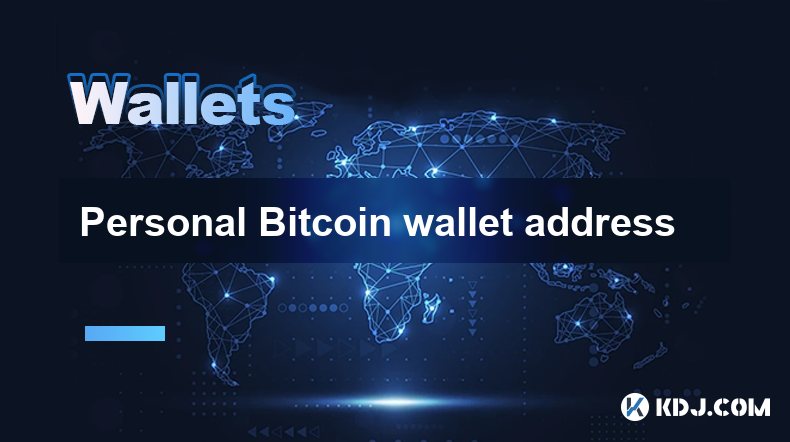
What is a Bitcoin cold storage wallet?
What is a Personal Bitcoin Wallet Address?
A personal Bitcoin wallet address is a unique string of characters that serves as a destination for receiving and sending Bitcoin payments. It's analogous to a bank account number, but designed specifically for the Bitcoin network. Each Bitcoin address is generated from a public key, which in turn is derived from the private key that allows you to access and spend your funds.
Do I Need a Personal Bitcoin Wallet Address?
Having a personal Bitcoin wallet address is essential for participating in the Bitcoin ecosystem. Here's why:
- Receive Bitcoin payments: You'll need a Bitcoin wallet address to receive Bitcoin payments from others, including exchanges, merchants, and individuals. It's akin to providing your bank account number to receive funds.
- Send Bitcoin payments: To send Bitcoin to another person or entity, you'll need their Bitcoin wallet address as the destination. It's similar to entering a bank account number when making an electronic fund transfer.
- Verify your identity: Some cryptocurrency exchanges and services may require you to provide a Bitcoin wallet address to verify your identity. This helps prevent theft, fraud, and other security concerns.
- Full control over your funds: Having a personal Bitcoin wallet address means you retain full control over your funds, unlike keeping your Bitcoin on an exchange or other third-party platform.
Key Points:
- Different types of personal Bitcoin wallet addresses are explained.
- The importance of keeping wallet addresses secure and protected.
- Overview of popular and secure personal Bitcoin wallet options.
- Tips and best practices for managing and maintaining your Bitcoin wallet.
Types of Personal Bitcoin Wallet Addresses:
- Single-use addresses: As the name implies, these are one-time-use addresses generated for each incoming transaction. This adds an extra layer of privacy and security, as it prevents third parties from linking your transactions to a specific wallet address.
- Hierarchical Deterministic (HD) addresses: These addresses are derived from a master seed phrase using a deterministic algorithm. Multiple HD addresses can be generated from the same master seed, allowing you to manage several addresses conveniently without compromising security.
Securing Your Personal Bitcoin Wallet Address:
- Keep your private keys secure: Never share your private keys with anyone, as they provide access to your funds. Store them securely offline, ideally in a hardware wallet or on a piece of paper kept in a safe place.
- Enable two-factor authentication (2FA): For added security, use 2FA for any Bitcoin wallet or exchange account you may have. This requires you to provide an additional form of verification, such as a code sent to your mobile phone, when accessing your funds.
- Beware of phishing scams: Fraudsters often create fraudulent websites and emails that impersonate legitimate Bitcoin wallets or exchanges. Always double-check the authenticity of any communication or website before providing your login credentials or personal information.
Choosing a Secure Personal Bitcoin Wallet:
- Hardware wallets: These are physical devices that store your private keys offline, providing the highest level of security. Ledger and Trezor are popular hardware wallet manufacturers.
- Software wallets: These are software applications that store your private keys on your computer or mobile device. While less secure than hardware wallets, they offer greater convenience. Electrum and Exodus are examples of reputable software wallets.
- Paper wallets: These are physical documents containing your public and private keys printed on them. Paper wallets are considered highly secure as they are not connected to the internet.
Managing and Maintaining Your Personal Bitcoin Wallet:
- Back up your private keys: Regularly create backups of your private keys and store them securely offline in a separate location. In case of any device failure or wallet loss, your funds can be recovered using these backups.
- Keep your software up to date: Ensure that your Bitcoin wallet software is always updated to the latest version. Updates often include important security patches and bug fixes to protect your funds.
- Be mindful of transaction fees: Bitcoin transactions incur transaction fees, which vary based on network congestion and the speed of confirmation desired. Choose your transaction fees wisely to avoid overpaying or delays.
FAQs:
1. What happens if I lose my personal Bitcoin wallet address?
If you lose your personal Bitcoin wallet address, you may not be able to recover your funds unless you have a backup of the private key or a seed phrase used to generate the address.
2. Can someone steal my Bitcoin if they have my Bitcoin wallet address?
No, having your Bitcoin wallet address alone does not allow someone to steal your funds. They would also need your private key to access and spend your Bitcoin.
3. Do I need to pay to get a Bitcoin wallet address?
No, creating a Bitcoin wallet address is free of charge. There are various Bitcoin wallets available that offer free registration and wallet address creation.
4. How often should I change my Bitcoin wallet address?
There is no general rule on how frequently you should change your Bitcoin wallet address. However, it's considered good practice to generate a new address for each significant transaction or periodically for added privacy.
5. Can I create multiple Bitcoin wallet addresses?
Yes, you can create multiple Bitcoin wallet addresses. This can be useful for separating different uses, such as having one address for personal use and another for business transactions.
Disclaimer:info@kdj.com
The information provided is not trading advice. kdj.com does not assume any responsibility for any investments made based on the information provided in this article. Cryptocurrencies are highly volatile and it is highly recommended that you invest with caution after thorough research!
If you believe that the content used on this website infringes your copyright, please contact us immediately (info@kdj.com) and we will delete it promptly.
- Rollman Management Invests $20 Million in IBVM's Bitcoin Layer 2 Technology
- 2025-05-05 22:30:12
- Binance Expands Spot Trading Pairs with ENJ/USDC and VIRTUAL/TRY
- 2025-05-05 22:30:12
- BC.GAME Launches Phase 2 of Its $BC Mining Event, Featuring a 1 Billion $BC Prize Pool
- 2025-05-05 22:25:12
- VanEck Files with the SEC to Launch the First U.S. BNB-Based ETF
- 2025-05-05 22:25:12
- Critical Security Flaw in Solana Labs' Token-2022 and ZK ElGamal Proof Programs
- 2025-05-05 22:20:11
- Former U.S. President Donald Trump Reiterated His Support for Cryptocurrency
- 2025-05-05 22:20:11
Related knowledge
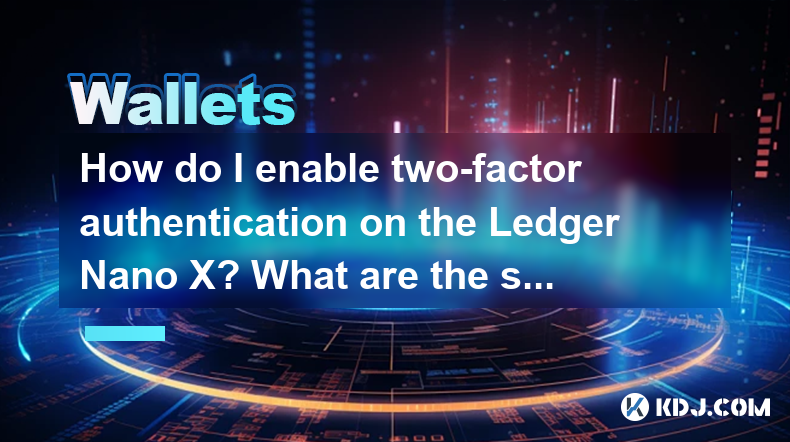
How do I enable two-factor authentication on the Ledger Nano X? What are the security options?
May 02,2025 at 09:49pm
Enabling two-factor authentication (2FA) on your Ledger Nano X is a critical step in securing your cryptocurrency assets. The Ledger Nano X offers robust security options that enhance the protection of your digital wealth. In this article, we will guide you through the process of enabling 2FA on your Ledger Nano X and explore the various security featur...
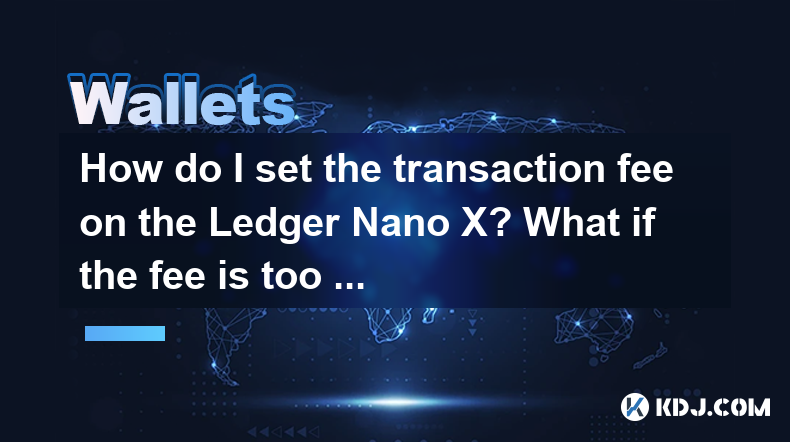
How do I set the transaction fee on the Ledger Nano X? What if the fee is too high?
May 05,2025 at 09:21pm
Setting the transaction fee on your Ledger Nano X is an essential part of managing your cryptocurrency transactions efficiently. The transaction fee directly impacts how quickly your transaction is processed and confirmed on the blockchain. In this guide, we will walk you through the steps to set the transaction fee on your Ledger Nano X, and what to do...

How do I export the Ledger Nano X transaction history? How long can the data be saved?
May 04,2025 at 07:21am
Introduction to Ledger Nano X and Transaction HistoryThe Ledger Nano X is a hardware wallet designed to store your cryptocurrency safely. It supports a wide range of cryptocurrencies and offers robust security features. One of the essential aspects of managing your cryptocurrencies is keeping track of your transaction history. The Ledger Nano X allows y...
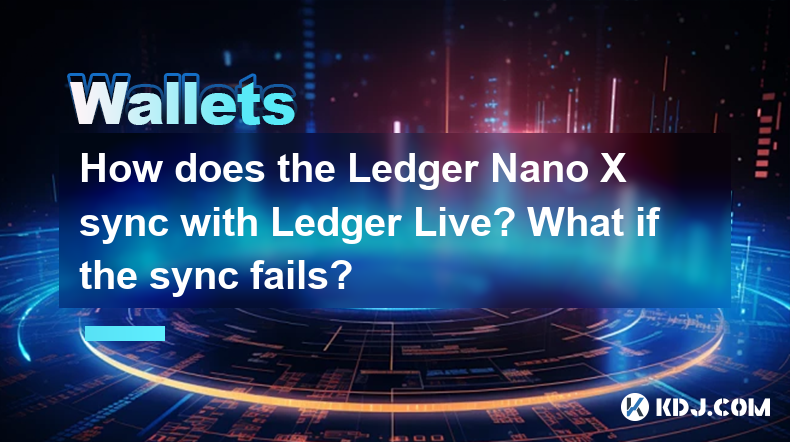
How does the Ledger Nano X sync with Ledger Live? What if the sync fails?
May 04,2025 at 12:07pm
The Ledger Nano X is a popular hardware wallet that allows users to securely manage their cryptocurrency assets. One of the key features of the Ledger Nano X is its ability to sync with the Ledger Live application, which provides a user-friendly interface for managing your crypto portfolio. In this article, we will explore how the Ledger Nano X syncs wi...
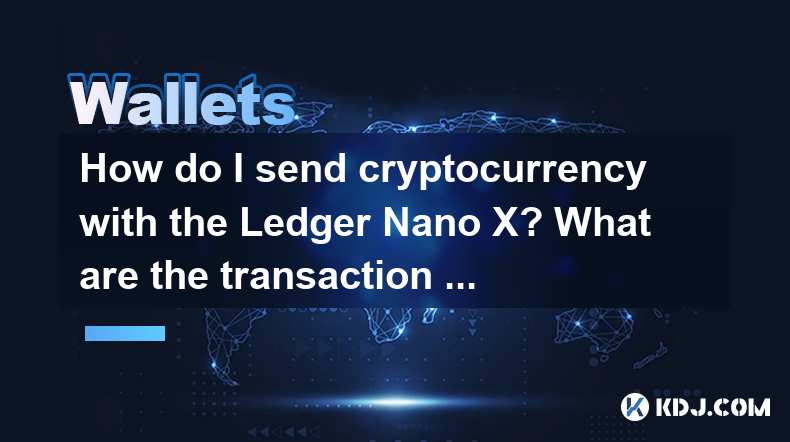
How do I send cryptocurrency with the Ledger Nano X? What are the transaction confirmation steps?
May 03,2025 at 05:01am
Sending cryptocurrency using the Ledger Nano X involves a series of steps that ensure the security and accuracy of your transactions. This process is designed to be user-friendly while maintaining the high level of security that Ledger devices are known for. In this article, we will guide you through the process of sending cryptocurrency with the Ledger...
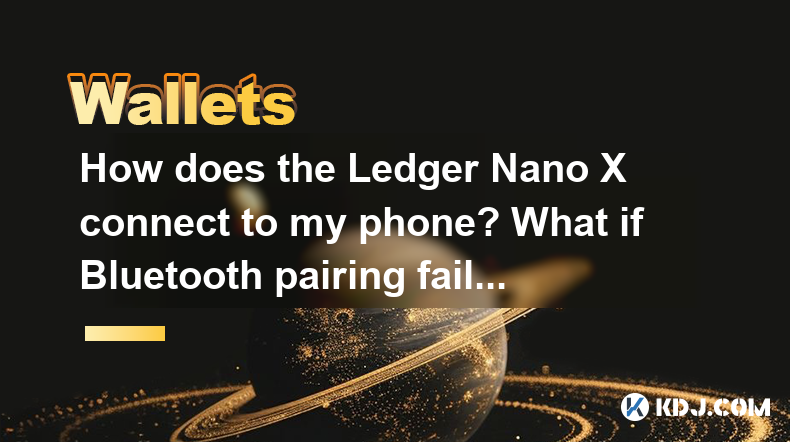
How does the Ledger Nano X connect to my phone? What if Bluetooth pairing fails?
May 02,2025 at 07:07pm
The Ledger Nano X is a popular hardware wallet designed to securely store your cryptocurrency. One of its key features is the ability to connect to your smartphone via Bluetooth, allowing for a seamless and convenient user experience. In this article, we will explore how to connect your Ledger Nano X to your phone and what to do if Bluetooth pairing fai...

How do I enable two-factor authentication on the Ledger Nano X? What are the security options?
May 02,2025 at 09:49pm
Enabling two-factor authentication (2FA) on your Ledger Nano X is a critical step in securing your cryptocurrency assets. The Ledger Nano X offers robust security options that enhance the protection of your digital wealth. In this article, we will guide you through the process of enabling 2FA on your Ledger Nano X and explore the various security featur...

How do I set the transaction fee on the Ledger Nano X? What if the fee is too high?
May 05,2025 at 09:21pm
Setting the transaction fee on your Ledger Nano X is an essential part of managing your cryptocurrency transactions efficiently. The transaction fee directly impacts how quickly your transaction is processed and confirmed on the blockchain. In this guide, we will walk you through the steps to set the transaction fee on your Ledger Nano X, and what to do...

How do I export the Ledger Nano X transaction history? How long can the data be saved?
May 04,2025 at 07:21am
Introduction to Ledger Nano X and Transaction HistoryThe Ledger Nano X is a hardware wallet designed to store your cryptocurrency safely. It supports a wide range of cryptocurrencies and offers robust security features. One of the essential aspects of managing your cryptocurrencies is keeping track of your transaction history. The Ledger Nano X allows y...

How does the Ledger Nano X sync with Ledger Live? What if the sync fails?
May 04,2025 at 12:07pm
The Ledger Nano X is a popular hardware wallet that allows users to securely manage their cryptocurrency assets. One of the key features of the Ledger Nano X is its ability to sync with the Ledger Live application, which provides a user-friendly interface for managing your crypto portfolio. In this article, we will explore how the Ledger Nano X syncs wi...

How do I send cryptocurrency with the Ledger Nano X? What are the transaction confirmation steps?
May 03,2025 at 05:01am
Sending cryptocurrency using the Ledger Nano X involves a series of steps that ensure the security and accuracy of your transactions. This process is designed to be user-friendly while maintaining the high level of security that Ledger devices are known for. In this article, we will guide you through the process of sending cryptocurrency with the Ledger...

How does the Ledger Nano X connect to my phone? What if Bluetooth pairing fails?
May 02,2025 at 07:07pm
The Ledger Nano X is a popular hardware wallet designed to securely store your cryptocurrency. One of its key features is the ability to connect to your smartphone via Bluetooth, allowing for a seamless and convenient user experience. In this article, we will explore how to connect your Ledger Nano X to your phone and what to do if Bluetooth pairing fai...
See all articles




















































































